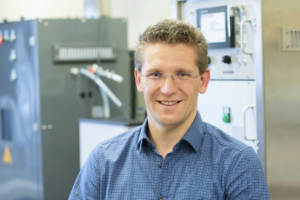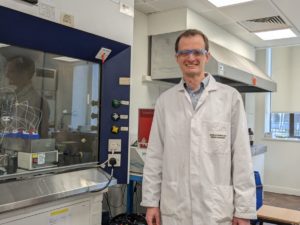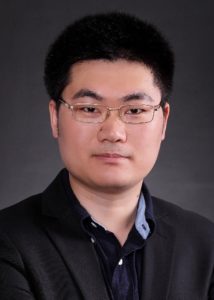 |
Dirk Ziegenbalg studied chemistry at Friedrich-Schiller-University Jena, Germany from where he graduated with a PhD in Industrial Chemistry in 2013. In 2012 he moved to University Stuttgart, Germany to establish a junior research group at the Institute of Chemical Technology. He holds a M. Sc. degree in Economics from the Friedrich-Schiller-University Jena, Germany. In 2018 he was appointed as a Professor at the Institute of Chemical Engineering of Ulm University, Germany.
His research interests focus on photochemical reaction engineering at the interface between chemical engineering, microreaction technology and photochemistry. Follow Dirk’s research group on Twitter to find out more |
Read Dirk’s Emerging Investigator article, ‘Photochlorination of toluene – the thin line between intensification and selectivity. Part 1: intensification and effect of operation conditions‘, DOI: 10.1039/D0RE00263A
1. How do you feel about RCE as a place to publish research on this topic?
RCE’s focus on the interface between chemistry and engineering is actually identical to my research interests. It has always been and still is a great challenge to communicate between the two disciplines, but such interdisciplinary research adds significant value to the generation of knowledge. A journal dealing with such interdisciplinary topics is very attractive and meets the research needs, which is reflected in the high quality of the published articles.
2. What aspect of your work are you most excited about at the moment and what do you find most challenging about your research?
The increasing research activities in the field of light-driven reactions, both at the fundamental and application level, are currently creating a very stimulating research environment. Bridging the gap between laboratory and industrial applications is very interesting, as there is a plethora of different aspects that need to be addressed. We have recently found that controlling the availability of light is not only a means to control the reaction rate, but also a powerful strategy to increase the efficiency of photoreactions and to switch between reaction pathways. I’m very excited to see how this how potent this strategy will be, The most challenging aspect of photoreaction engineering research is the strong coupling between reactions and transport processes, which requires extensive studies to unravel the underlying fundamentals.
3. In your opinion, what are the most important questions to be asked/answered in this field of research?
Objective and comprehensive documentation of experimental results and details is required to reduce the barriers to transferring laboratory results to industrial application. This explicitly includes details of the photoreactors and light sources. The development of reliable methods for measuring photons in (large) photoreactors is of great importance in this context. Scale-up and transfer strategies can only be derived with such comprehensive data sets. In this context, well-founded techno-economic evaluations of comparable light-driven and thermal synthesis routes are required to identify the bottlenecks. The impact of dynamic irradiation, either caused by changing environmental conditions for solar photochemistry or imposed by the operator when using artificial light sources, on reaction performance should be understood to develop appropriate control strategies and enable efficient use of photons.
4. Can you share one piece of career-related advice or wisdom with other early career scientists?
Stay curious and challenge yourself with new topics throughout your career. Go beyond the mainstream. New topics will be more challenging at first. But they will pay off in the long run.














